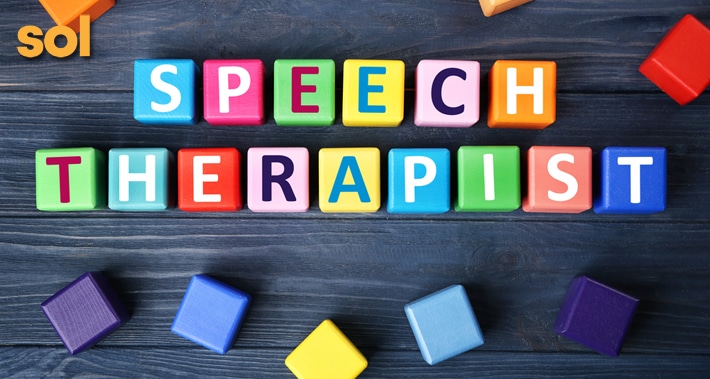
What would you say to someone if they said you had an accent?
Maybe this is something you hear all the time.
But hearing our own accent, the one we speak with, is very difficult.
Depending on where you live, you may hear different accents all around you, as in this day and age people move around from country to country and within different regions all the time.
But if your accent stands out to those around you, is that a bad thing?
The short answer is, of course not.
But a strong accent can sometimes interfere with communication.
Speech therapy for accent modification can be helpful in situations like this.
If you are struggling to communicate because you have a strong accent, speech and language therapy can help.
At Sol Speech and Language Therapy, we have a welcoming space to work with you to achieve your speech goals.
We can also work with you remotely using teletherapy services if that is preferred.
Now, let’s take a closer look.
What Is An Accent?
The sociolinguistic definition of accent is, “a manner of pronunciation peculiar to a particular individual, location, or nation.”
An accent is the way language sounds and is determined by the predominant way of pronouncing words in one area.
And like language itself, accents are always changing.
You can actually learn to modify your accent with a speech therapist.
RELATED: Considering Accent Modification Speech Therapy? Here’s What To Expect
Studies have shown that accents continue to develop when isolated groups of people start making small changes to how they pronounce words.
Specific countries have their own accent, and different accents often exist within a country, as you can hear when you visit Boston versus Austin, for example.
Linguists have even discovered that an Antarctican accent has begun to develop among the researchers stationed there.
Within regions, different ways of speaking are also classified as dialects.
What Is A Dialect?
A dialect is more all encompassing than an accent and is defined as a regional variety of language that includes pronunciation, grammar or vocabulary.
So when we talk about the “local dialect”, we’re not only referring to the accent but to the use of certain phrases.
Interestingly, dialects use language according to context, so in a business situation you may not walk into the boardroom and exclaim, “howdy y’all”, opting instead for something more formal such as, “good afternoon”.
But in certain situations, you may want to pull out a good “howdy y’all” to put the crowd at ease.
Different dialects are easy enough to learn, just by living in an area and listening to the locals speak.
But back to our discussion about accents, which are a lot harder to turn on and off.
Why Do People Have Accents?
The language we hear around us, especially when we are learning to speak, determines our accent.
So, people have different accents depending on where they were born and raised.
There are two types of accents:
Regional Accents
Regional accents occur within the native language and are specific to certain regions, such as the Boston example we gave earlier.
These accents are common to the people of a specific region within a country, but they tend to be native speakers of English like you.
National Origin Accents
Also called a foreign language accent, this is the accent heard in people who are non native speakers, e.g. they have learned English as a second language.
A foreign language accent is determined by the sounds of the speaker’s native language.
For example, the ‘w’ sound does not exist in German, so a native German speaker may have issues pronouncing ‘w’ when learning English.
Is It Bad To Have An Accent?
Accents are a natural part of spoken language.
An accent also determines your identity and is part of your heritage.
So no, it is not bad to have an accent.
In fact, the only way to avoid having an accent is to never speak at all.
You might not notice your accent, if you grew up in Austin and have never traveled far outside your hometown.
After all, people born and raised in Austin have an Austin accent.
But when you travel to rural Texas, you’ll stand out pretty quickly as an Austinite.
So, everybody who speaks has an accent.
But sometimes a strong accent can get in the way of being understood.
When learning a new language, it is important to get the pronunciation right, as you want to be able to communicate effectively with native speakers of that language.
If you have relocated and find that your accent is preventing you from being understood, then it may be time to seek the help of a speech therapist.
Can You Change Your Accent?
Have you watched the Barbie movie yet?
If so, you could be forgiven for thinking its lead actress, Margot Robbie, is American.
But in interviews, she very clearly has an Australian accent.
Likewise with the Spiderman movies starring Tom Holland – he’s from England, but his Spiderman character is from New York, and sounds like it.
These actors learned how to alter their accents for film appearances.
An accent is fluid.
That is, it varies from one area to the next and is not fixed, and so therefore it can be modified.
For some people, absorbing the local accent comes easier than others, especially for children, who pick up variance in language very easily and learn through mimicry.
It’s worth mentioning here that the common myth that speaking more than one language at home can make your child more likely to develop a speech disorder is false.
But as you get older, especially if you’ve spent your whole life speaking with one accent, change can be hard and requires a lot of commitment and practice.
As a result, accent modification tends more often to be a speech therapy for adults matter than it is a pediatric speech therapy issue.
Learning a new language is often most effective when you can travel to the country and surround yourself with native speakers.
Lots of practice both listening and speaking the language will help you to modify your own way of speaking.
Changing your accent is known as accent modification, and it is something a speech therapist can help with.

How Can A Speech Therapist Help With Your Accent?
A speech therapist can help you if you are looking to:
- Change your regional accent
- Speak English as a second language more effectively
- Learn to communicate better in the workplace
- Learn a new accent, for example, as an actor for a role
- Reduce speaking related anxiety
- Improve speech and pronunciation after a traumatic brain injury
Recent studies indicate that accent modification training is effective and leads to benefits in communication, academic performance, and self advocacy, especially in healthcare settings.
Speech therapy for accent modification helps you to hear your own accent, discover the rhythm of your own speech, and understand how you sound when you talk.
The speech therapist will ask you to read specific words and sentences, listening to the way you pronounce the sounds.
You will also be asked to describe the issues you are experiencing and together you will set goals to improve your communication skills.
You may work one on one with the speech therapist, or you may participate in group discussion.
Lots of practice with a trained professional will help you to identify the issues and modify the way you speak, so that everyone can understand you.
Our speech therapists at Sol will also teach you mindfulness that compliments your speech therapy.
Book Your Appointment With Sol Speech And Language Therapy Today
Are you struggling to communicate as you learn English as a second language?
Have you relocated to Austin or Round Rock, Texas area and feel the need to refine your accent?
If so, our licensed speech pathologists can help you.
If you’re thinking of reaching out, but have some questions first, take a look at this list of frequently asked questions about speech and language therapy.
We also have a long resource list for you to refer to throughout your treatment.
Don’t hate your accent, it is part of who you are.
But it shouldn’t get in the way of who you are trying to be.
Book your appointment with Sol Speech And Language Therapy today.
6448 E Hwy 290 Suite E-108,
Austin, TX 78723
(512) 368-9488
» https://g.page/r/CfRfhOpEQm7BEAE
Sol Speech & Language Therapy
555 Round Rock W Dr E-221,
Round Rock, TX 78681
(512) 808-3953
» https://g.page/r/Cb5pwCTosSEfEBM
Sol Speech & Language Therapy offers personalized skilled intervention to those struggling with their speech and language skills. Services offered include screening, consultation, and comprehensive evaluation. We also provide one-on-one and/or group therapy for speech sound disorders, receptive/expressive language delay/disorder, stuttering/cluttering, accent reduction, and much more.